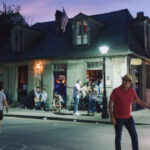H.P. Lovecraft’s famous assertion that “the oldest and strongest emotion of mankind is fear, and the oldest and strongest kind of fear is fear of the unknown,” perfectly encapsulates the chilling power of horror. What distinguishes horror from other genres like mystery or action is its exploration of elements beyond our comprehension – the unexplainable, the monstrous, the alien. This realm of the unknowable, where threats are undefined and defenses are futile, is the unsettling territory masterfully navigated by Rod Serling in The Twilight Zone, particularly in episodes like “The Monsters Are Due On Maple Street.”
Expert Devendra Varma articulated the nuance between terror and horror, defining terror as “awful apprehension” and horror as “sickening revulsion.” Terror builds suspense, the dread of impending doom, while horror is the stark realization of that doom already manifested. “The Monsters Are Due on Maple Street” stands as a quintessential example of brilliant scriptwriting because Serling expertly guides the audience through this transition, from the mounting terror of anticipation to the stark horror of realization.
Like the most impactful Twilight Zone episodes, “The Monsters Are Due on Maple Street” delivers a potent, fable-like punch, echoing the social allegories found in works like Arthur Miller’s The Crucible. Written nearly a decade after Miller’s play about the Salem witch trials, Serling’s script similarly dissects the fragility of societal bonds. It reveals how easily fear and uncertainty can turn ordinary people into their own worst enemies. Faced with inexplicable events – in this case, a sudden power outage – the residents of Maple Street devolve into suspicion, blame, and ultimately, self-destruction.
Fueled by the imaginative fears of a young boy steeped in science fiction lore, the neighbors begin to see the monstrous “other” not as an external threat, but within their own community. As darkness descends, phones die, and cars become inert, the desperate need for a scapegoat ignites. Serling masterfully portrays this societal breakdown, allowing viewers to witness the horrifyingly inevitable chain reaction as paranoia consumes Maple Street. The episode remains a disturbingly relevant commentary on human nature, particularly in an age where fear and division are so easily manipulated.

